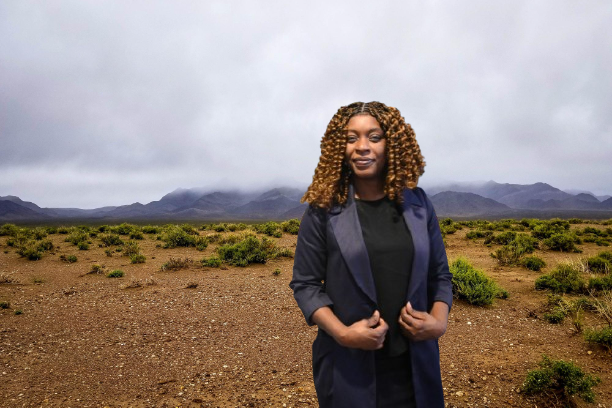A female Nigerian scientist has provided a new perspective on how space science and technology could be deployed for climate resilience.
The work of Susan Ene Ajonye, a senior scientific officer at Nigeria’s space research institute, the National Space Research and Development Agency (NASRDA), may have evolved a template that provides additional insight in the deployment of space technology for effective environmental management.
With a goal to contribute to global climate resilience, using satellite technology to monitor and mitigate the impacts of climate change, Susan Ajonye has been at the forefront of using technology for the greater good, as seen in her works that emphasize the protection of vulnerable water bodies and her contributions to international efforts to curb environmental degradation,
Her groundbreaking work on using satellite remote sensing to assess Jabi Lake in Abuja has earned her national recognition and demonstrated the immense potential of satellite technology in managing urban development and environmental sustainability.
Ajonye’s innovative use of satellite remote sensing has not only provided crucial insights into the state of Jabi Lake but has also opened the door for new approaches to environmental monitoring across Africa and beyond. As Nigeria continues to face the challenges of urbanization and climate change, the work of scientists like Susan will be essential in ensuring a sustainable future for all.
In a 2016 publication, Remote Sensing Assessment of Jabi Lake and Its Environs, became a landmark study in Nigerian environmental science. Using Landsat satellite imagery, Ajonye and her team tracked the changes in land use and land cover around the Jabi Lake over a period of 27 years. The results of the study provided a critical insight into how urbanization is impacting one of Abuja’s most vital water bodies, while also underscoring the importance of continuous monitoring through satellite technology.
Her work on Jabi Lake was among the first to apply satellite remote sensing on such a scale to urban water bodies in Nigeria. The research also resulted in key findings about how rapid urban development has affected Jabi Lake and its surrounding areas.
According to the study, the lake’s water body experienced relatively minor fluctuations over the years, but the surrounding landscape showed worrying trends. The reduction in vegetation cover and the expansion of built-up areas pointed to the risks posed by uncontrolled urbanization.
In a city like Abuja, where urban expansion is occurring at an unprecedented rate, Ajonye’s findings highlight the need for better management of natural resources. The loss of green spaces and the increase in built-up areas around Jabi Lake have contributed to environmental degradation, which, if left unchecked, could severely impact the lake’s ecological and socio-economic functions.
Her work proved how critical satellite technology is in assessing environmental changes over time. By using satellite imagery, policymakers are provided with accurate, real-time data that can inform sustainable urban planning and environmental protection policies.
The importance of monitoring water bodies like Jabi Lake extends far beyond the borders of Abuja. Many lakes and rivers are facing threats from human activities and climate change throughout Africa. A striking example is Lake Chad, which has shrunk by over 90% since the 1960s due to unsustainable irrigation practices, climate change, and overuse of water resources. Lake Chad’s shrinking has devastated the communities and ecosystems that depend on it, leading to food insecurity, displacement, and conflict.
Ajonye’s work on Jabi Lake serves as a powerful reminder of the need to safeguard water bodies across Africa.
“Nigeria’s lakes, rivers, and wetlands could face similar fates without proper monitoring and management. The use of satellite technology provides a vital tool in tracking the health of these water bodies and ensuring they are protected for future generations,” Ajonye wrote.
According to her, Jabi Lake plays a crucial role in Abuja’s urban landscape, serving as a center for recreation, tourism, and residential development. However, Ajonye’s study has revealed that the lake is at risk from the pressures of urban encroachment.
“Our findings showed that while the water body itself remained largely stable, the surrounding area has seen a drastic increase in built-up land, accompanied by a reduction in vegetation cover. This shift poses long-term risks to both the lake’s ecosystem and the quality of life for residents in the area,” Ajonye revealed in her publication shared with AfricaSTI.
Ajonye’s research emphasized the positive factors that draw people to the Jabi Lake area, such as its beautiful scenery and accessible roads. On the other hand, she identified centrifugal forces, factors such as high land prices and environmental degradation—that could deter further development and negatively impact the area’s sustainability.
Her study concluded with a call for continuous monitoring of Jabi Lake to ensure that urban development does not come at the cost of environmental health. Ajonye advocated for protective measures such as creating buffer zones around the lake, regulating waste disposal, and promoting eco-friendly development practices.
Meanwhile, Ajonye’s contributions to environmental science have not gone unnoticed. Her work on Jabi Lake earned her national recognition, and her award-winning paper has been praised for its depth and relevance. She has become a leading voice in Nigeria’s scientific community, known for her ability to merge advanced satellite technology with practical solutions for sustainable development.
While her research on Jabi Lake has had a profound impact locally, Ajonye’s ambitions extend beyond Nigeria. She is currently expanding her work to have a global reach, focusing on how satellite data can be used to address environmental challenges around the world. By collaborating with international research organizations and environmental agencies, she aims to develop models that can be applied to other water bodies facing similar threats.





